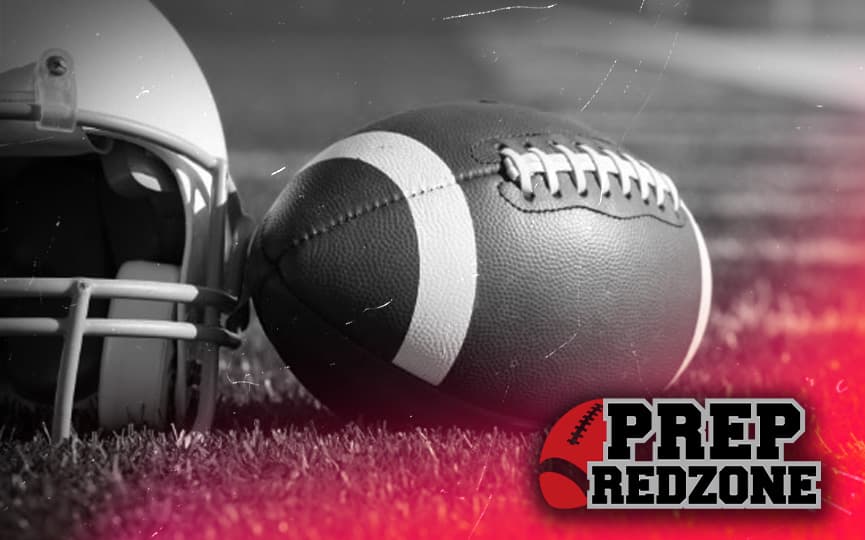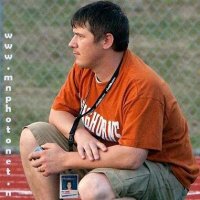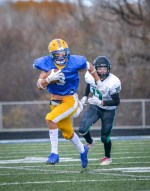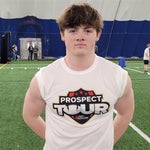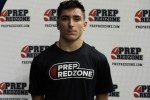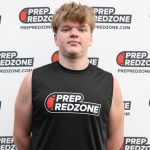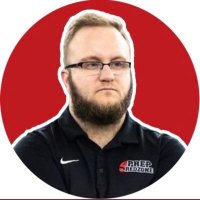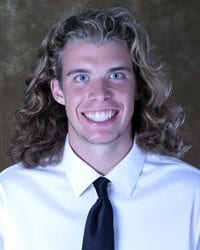Program Profile: Rochester Lourdes
What motivates high school football players?
One of a head football coach’s many jobs is to learn how to motivate his players. Three state titles in the last six years has helped Rochester Lourdes’ head coach Mike Kesler motivate his players, but Kesler and the Eagles’ program take their motivation to the next step. They take their motivation with them – literally.
“In my second year (as head coach) we lost to Triton 50-13. We were frustrated, and we were trying to figure out what motivates kids. We decided why don’t we ask them? We have an old wooden box that goes with us wherever we go,” Kesler said. “It has the word ‘Together’ on the outside of it. In that box is our fuel. At the beginning of the year, I tell the kids what motivates me – my family. That is my fuel. My faith and my family come before football, so I put my wedding ring in the box to signify what motivates me.”
During the final practice of the week in the regular season, a selected group of seniors tell their teammates what fuels them and put something in the box that signifies what motivates them. By the end of the regular season, every senior has added something to the box. Outside of Kesler’s wedding ring, no one outside of the Eagles’ locker room knows what is in the box.
“Even the parents don’t know what is in the box,” Kesler said. “We tell our freshman every year this stays in (the locker room). Throughout the year more things get added to the box. It adds more and more fuel.”
When Kesler says the box goes wherever the team goes, he is not kidding. It shows up in the official team photo and is on the sidelines with them during games.
“We played in the Metrodome in 2012 and security wouldn’t let us bring the box in because it has a lock on it,” Kesler said. “We told security ‘if that box doesn’t come in, we are not coming in’. We had to wait outside – it was freezing cold out – so they could go get a big bolt cutter to bust off the lock. We came back the next year and the same security guard was there, and we told her ‘hey, we’ve got the key.'”
What initially fueled Kesler’s love of football was his family.
“I am the youngest of six kids,” Kesler said. “I have two brothers and three sisters. My dad was a youth football coach. I was always hanging around my brothers and my dad at practices. I grew up around it and couldn’t wait to play.”
His first practice made him wonder if football was all it was cracked up to be.
“My dad was my first coach and in my first practice; he stopped practice multiple times to teach us to double knot our shoes because he didn’t want to stop practice to tie shoes. And he made us run a lot. That first night I was so mad – I didn’t sign up to just run and tie shoes.”
Things improved from that first day. Kesler was a four-year varsity player and a three-year starter for Lourdes. After high school, he went on to play linebacker for South Dakota State. It wasn’t long before he was right back with the Eagles’ football program.
“I was looking for a teaching job, and right before the school year one opened up at Lourdes,” said Kesler whose father was the captain of the Lourdes football team in 1953. “I got the job, and they asked if I wanted to coach football too.”
Kesler was the defensive coordinator under Marv Peters for eight years before taking over the head job.
In addition to Peters and Denny Nigon, who coached football at Lourdes, John Stiegelmeier, who was Kesler’s coach at SDSU and Rich Decker who was Kesler’s high school basketball coach influenced the current Lourdes football coach. To this day, Kesler uses his example of how to treat kids off the field and how to balance being a football coach and being a solid citizen.
“I took pieces from all of them,” the Lourdes’ alumnus said, “but ultimately I want to focus on the kids and focus on trying to develop these kids into the best young men they can possibly be.”
Head coach of Rochester Lourdes was Kesler’s dream job.
“It is neat to come back to a school where my dad played, my mom graduated from there, my five brothers and sisters went there. A strong Catholic education was important to me and important to my parents.”
Coaching the Eagles gave Kesler a chance to share his faith with the kids.
“I love the opportunity to pray with our kids, talk about our faith. I think it might allow us to get to a deeper level with the kids. Having the opportunity to attend mass as a team and to have that opportunity in a faith-based environment is special.”
When Kesler was an assistant, the program was hovering around the .500 mark with Peters’ last two years as head coach being the most successful. When Kesler took over, the program struggled – for a minute.
“My first year we went 2-7. I knew we needed an identity. We needed everyone on the same page. For me, that came down to one thing – together. That one word defines our program – together. Everyone had to understand what that meant.”
What it meant was explained in two steps.
“You are not in it for yourself – we are in it for the kids,” Kesler said. “We needed our brand of football to be consistent. I wanted to play a physical style – running the football and stopping the run. It is Minnesota high school football, and you look around the state, and the most successful programs run the ball and stop the run.”
The type of running game Lourdes would play came from Kesler’s many sleepless nights.
“Being a defensive coordinator for eight years – what kept me up at night was teams that played option football. I wanted to try to keep some other people up at night.”
Switching to an option offense took time and a 2-7 season.
“I had a lot of doubts that first year, but in my 12 years of coaching the team that improved the most was that year. The first game of the year we lost our senior quarterback. Here I was, a first-year coach starting an eighth grader (at quarterback). We even struggled to move the ball. We won our first game in Week Six on a last second play. In Week Eight we lost a close one to Cannon Falls who was ranked in the top five before losing to Plainville-Elgin-Millville. That team got so much better between Week One and Week Nine. Even though we were 2-7, we could look at it and take that improvement.”
The next year the Eagles went 10-3 – losing to Becker in the Class AAA semi-finals. It would be the first of three straight trips to State.
“Success kind of breeds success,” Kesler said. “Everyone got on board, and the program just continued to grow.”
The coaches continued to grow as well. When Kesler first started, the Eagles ran a base 5-3 defense, but in 2009 they were beaten twice by Kasson-Mantorville and their spread offense. With the spread here to stay, the coaching staff switched to a base 4-2 defense and have been running a variation of it ever since.
With the Foundation in Place, Lourdes Stays Together
One of the many reasons for Lourdes’ success is a consistent coaching staff.
“It is critical that we are all on the same page. I have been blessed to have three key guys that have been with me since I took over.”
Before the season starts, the coaching staff takes a step back and allows the players to dictate what page everyone starts on.
“After the first week of fall camp, the kids get together and then come back and let the coaches know what the goals are for the season. The captains come up and read them off. It is our job as coaches to do the best we can to help them reach their goal,” Kesler explained. “(The goals) come from the kids. It doesn’t come from me, so it is ownership on their end. We tell them ‘seniors, this is your year, this is your program. If you want to get here, this is what it is going to take. If I am saying we are going to do this or that – it doesn’t do any good. If it comes from them and you can hold them accountable for the goals they set without us being there – that is powerful as far as the kids go.”
After the kids set the team’s goals, and practice begins, Kesler and his staff run a fast-paced practice with an emphasis on fundamentals and little things like hand placement line splits. Kesler admits watching an everyday practice might be boring to the outside observer, but it works for Lourdes. So have the three rules Kesler has for the program.
“It starts with one word – together – but then it comes down to our expectations. They are very simple. Number one is be here. Number two be on time, and number three is key – attitude and effort. You can’t have one without the other – that is why they are both number three. No one else can dictate your effort except you.”
When the season is over, the program makes a point of continuously looking to improve itself.
“After every season, I meet with all the underclassmen and every coach individually, and we talk about the year, how they thought it went,” Kesler said. “I ask them about me. I take all the information, and when the staff gets together for the first time in the offseason, I share that data with the coaches. We go through it all. It is a constant battle to get better. You can’t get in a comfort zone.”
Kesler does want his players to be in a comfort zone with him.
“We go out and watch our kids compete in basketball and hockey and track, so those kids know that we do care about them. It is the whole ‘they don’t care how much you know until they know how much you care’. That is a piece, and we take that seriously.”
In seventh and eighth grade, future Eagles’ football players are already learning the basic offense and defense they will see at the varsity level.
“They have the terminology down; they have the basic concepts down – that is huge – having our seventh and eighth graders have that,” Kesler stated. “They play our league schedule – whoever we play on Friday they play on Tuesday.”
Kesler realized early on that he was going to need help from the outside to run the program.
“Our parents make a huge commitment to have their kids go to our school. I want them around the program. I meet with our senior moms every year. They organize things like team dinners, picnics, fundraisers and engage the other parents. I try to go out of my way to make sure our parents feel like they are a part of this as well.”
Next season a big part of the on the field work will be done by only a handful of seniors. Lourdes will only have six returning seniors. Noah Borgeson started at guard. Matt Bowers started at nose tackle. Jake Groteboer started at middle linebacker and fullback as a sophomore and will be a big part of the program’s success the next two years.
Even though they will start 2017 with many new starters, the program will not change its approach.
“We try to be consistent with our discipline and our philosophy,” concluded Kesler. “There are some things we can’t waver from – like together. That has gotten us to where we are. There are things you are going to tweak – X’s and O’s wise – but ultimately your foundation you can’t waver too much from why you’ve gotten to be where you are at.”
On an individual level, part of the reason the Rochester Lourdes’ players and coaches have gotten to where they are because of what the inside of an old wooden box signifies. As a team, they have gotten to where they are largely because of the meaning of the word on the outside of the box – together.
